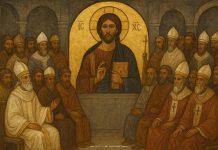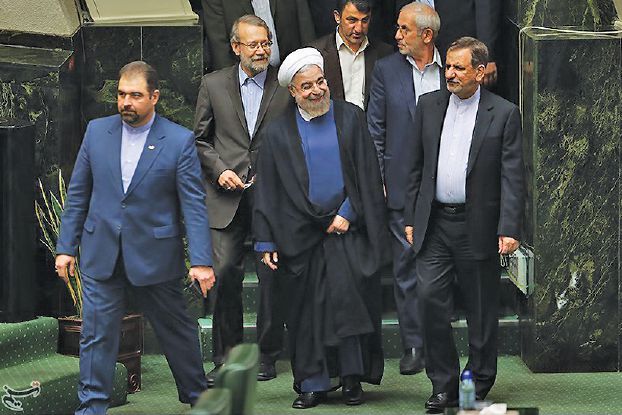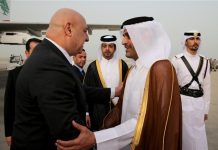Iran: The Regime’s Nature and Its Calculations
Eyad Abu Shakra/Asharq Al Awsat/May 26/17
It was interesting that the arrival of the US president Donald Trump in Riyadh in his first foreign visit since taking office should coincide with the election of Iran’s President Hassan Rouhani for a second term.
Avoiding the temptation of ‘conspiracy theory’, I reckon it was very much in the interest of the Iranian regime that Rouhani easily defeated his opponent Ebrahim Raisi who is thought of as the future ‘supreme guide’, given the change of leadership in Washington. Such a result reflects a wise and tactful approach by the ‘movers and shakers’ in Tehran to internal as well as foreign policies.
Those ‘movers and shakers’ may be pretty extremist anti-Arab and anti-West, but it doesn’t follow that they are stupid. Actually, the opposite is true; as there are many smart and cultured individuals in the Iranian regime who are skillful political and tactical operators and understand the limits of adventures and open hostilities, thus, never hesitate to bend before the storm.
Now that Barack Obama has left office carrying with his vision for the Middle East, a Republican administration is in charge. It is less convinced of Tehran’s leaders’ ‘moderation’, and more doubtful that their policies of sectarian incitement, military intervention, and direct hegemony adopted towards the Arab world are the best way to fight terrorism.
Hence, with the apparent end of the American-Iranian honeymoon, beginning with Syria, Tehran’s political ‘kitchen’ felt in need to balance out the two Iranian power blocs, although they are nothing but the two sides of one coin. With this in mind, the final six presidential candidates were approved, while others were disqualified including Mahmud Ahmadinejad, the former two-term president!
Of course, the ‘supreme guide’ remains the real ruler of Iran, regardless of the attempts of its state PR machine to promote a mirage of democracy. Indeed, the unrivalled position of the ‘supreme guide’ is a fact even the much trumpeted ‘reformists’ Rouhani and his vice president Mohsen Jahangiri by the Iranian people during the last four years of his presidency, he would never had the courage to raise the issues of corruption, unemployment, social problems, and claim to the champion of the poor, as he did during the televised debates. The fact is that Rouhani’s tough talk was directed at the de facto presidential candidates of the IRGC, which thanks to its institutions, interests, and money, network the real powerbase of Iran’s security system and its major strike force.
This actually means that the election campaign, just like ‘Iranian democracy’ itself, is flawed and self-contradictory; since the president does not rule … and the real ruler is neither the president nor a candidate to be chosen through elections.
Despite this fact one has to accept that Iran has gained in political savviness since 1979 with the emergence of ‘pragmatists’ like Ali Akbar Hashemi Rafsanjani, Mohammad Khatami, and later Hassan Rouhani, who have mastered the policy of taking a few steps forward and one step backward. And although ‘conservative’ hawks remain the real mainstay of the regime and the honest reflection of its true nature, those infrequently described as ‘reformists’ and ‘moderates’ are much closer to the pulse of people, millions of whom do not agree with the regime’s political priorities.
Here it is worth recalling how the ‘Revolution devoured its children’. Hundreds, indeed, thousands of the Iranian revolution were liquidated. Former foreign minister Sadegh Ghotbzadeh was executed after being accused of plotting to overthrow the Government and kill Ayatollah Khomeini; Abolhassan Banisadr, the first president after the 1979 revolution, had to flee the country after being impeached and is now living in exile in France. Even senior clerics, such as Grand Ayatollah Mohammad Kazem Shariatmadari and Grand Ayatollah Hussein Mutazeri, suffered for their opposition. And last but not least, both a former prime minister, Mir Hussein Mousavi, and a former parliament speaker Mehdi Karoubi, have been placed under house arrest since the 2009 pro-democracy ‘Green Path of Hope Movement’.
The reality is that most Iranian voters do not remember – and do not care about – the old legacy of hate against the Pahlavi royal family, and the abuses of the old royalist SAVAK secret police; as around %70 of Iranians are under-30 years old. Thus, they are not hostages to memories but are rather dreamers for a better future, and deservedly so. They have every right to dream of steady jobs, better education, refining their oil more efficiently, and sure enough, live in peace with their compatriots and neighbors instead of demonizing and fighting them.
Moreover, it is ironic that against the logic of accountability in proper democracies, incumbent president Rouhani was re-elected by ‘protest votes’ against the real rulers. Most of the votes cast in Rouhani’s favor were not ‘his’ but ‘against’ his adversaries, i.e. the ‘supreme guide’ and the IRGC and their authority, even though he is a product of this authority.
What will happen next?
The first question must deal with Rouhani’s policies during his second term, and the second would be about the future of his challenger Raisi.
The new Middle East perhaps best portrayed by Trump’s pictures in Riyadh should send a clear message to Rouhani. It may be beneficial for him if follows Washington’s new approaches in the Arab ‘arenas’ that Tehran managed to penetrate during Obama’s presidency. So far one of Washington top goals is undoing the Russo-Iranian alliance with all its consequences in the Region.
As for Raisi, one wonders if his chances of becoming ‘supreme guide’ can survive his crushing defeat. For even in a lame democracy, like Iran’s, it may prove difficult for someone so strongly rejected by people, in what has been described as fair and clean election, to assume absolute power like that of the ‘supreme guide’!






















